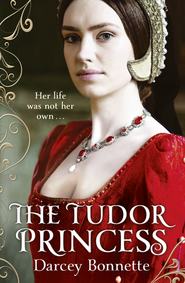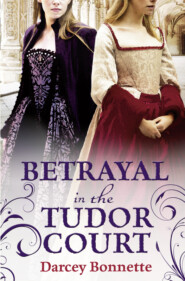По всем вопросам обращайтесь на: info@litportal.ru
(©) 2003-2025.
✖
Rivals in the Tudor Court
Настройки чтения
Размер шрифта
Высота строк
Поля
The baron does not look at me once. He slashes Rain’s throat, discarding the animal on the floor and returning to his seat. He takes in a deep breath, wipes his hands on his linen, and commences to eat his mutton.
I crawl toward my slain dog. Steaming blood oozes from his silvery throat. I do not know what to do. I start trying to push it back inside him. I press my hand to his throat.
I regard the baron, whose back is to me, hoping to project as much hatred into my eyes as is possible, but it does not matter. He does not see me. He is eating his supper, complaining of King Edward IV, who has wronged him so.
I am glad, I think to myself, that he was denied his grand title. Indeed, I hope every misery possible is heaped upon the man until he draws his dying breath.
“Tom!”
My grandmother’s voice is stern.
I turn toward her, blinking back tears. Rain’s blood is slick against my hand.
“Take that thing out of here and bury it,” she orders.
As I gather my pet in my arms, I hear her tell the baron, “Really, my lord, you should have commenced with that unpleasantness elsewhere. It has positively ruined my appetite.”
I take Rain outside, laying him in the snow; I have no idea where to bury him. I will not think of it now. I cannot. Icy tears slide down my cheeks as I remove my shirt and wind it about his throat, then, shivering, rest my head on his side, raising my eyes to the heavens, seeking out the clouds.
One of them looks like a dagger.
Three years later my grandfather announces the death of little Anne Mowbray, King Edward IV’s eight-year-old daughter-in-law and heiress to the dukedom of Norfolk.
“I have lost all to a child-prince. Richard has won the day,” he laments.
We are in the “war room,” a large chamber devoted to maps and a store for the family’s finest suits of armour. The baron is standing over the large mahogany table, tracing the unattainable Mowbray lands with his index finger.
My father shrugs. He is not as afraid of the baron as the rest of the family is. They are a bit alike, though my father, Sir Thomas, is more subtle in his approach, favouring locking someone away in a chamber without food for a few days as opposed to wasting his energy on the administration of beatings.
I am certain to keep my face void of expression during their exchange. After the countless lashings I have endured, I know anything—a blink, a dreamy smile, a twitch—can set Grandfather off. I stay still. Calm. I have practised in the glass, this look of impassivity. Many an hour has been devoted to learning the art of self-control. I will not speak against him; I will not cry out.
Perhaps this frustrates him the most. The others cry when he beats them and indeed they should not, as they are not beaten half as much as I. I do not cry. It is what he waits for, I think; he longs for my tears, for me to beg him to stop.
But I will never beg him for a thing, not ever.
And so in this vein we shall continue, until one of us outlives the other.
Sir Thomas turns to me with a slight smile. “But we shall remain the king’s loyal servants, shall we not?” he asks in light tones. “Edward is a mortal man, God bless him. His reign cannot last forever.” How easily he speaks treason! “Meanwhile, we shall serve him and elevate ourselves the old-fashioned way.”
I wonder what the old-fashioned way is but do not dare ask. I am wondering why Sir Thomas has summoned me to this little conference to begin with.
“Here, my boy,” says Sir Thomas, extending his arm to me. “A gift for you.” With a dramatic gesture, he pulls a large bolt of velvet aside to reveal in the corner a suit of armour. “Happy Christmas, lad.”
My very first suit of armour!
“I am big enough now?” I ask, smiling in spite of myself.
Sir Thomas nods.
“I wouldn’t say that,” pipes in the baron, “but we cannot wait forever. You are already a year behind the other boys; most receive their armour at seven. He’s a little mite, Thomas.”
“Size is irrelevant,” says Sir Thomas in firm tones. It is the first time I have ever heard him address the baron such. To me he says, “It is about intelligence, Little Tom.” He taps my temple with his fingertip. “Battles are won up here before they are ever won on the field. Learn the art of strategy and you will make an incomparable knight. Now. Have a look.”
I inch forward, ignoring the baron’s insult regarding my diminutive stature as I reach out to touch my new armour.
How grand it is! I run a hand along the shining breastplate, imagining myself a strong, tall man of twenty or so, lance poised at my hip as I forge ahead on my charger—a black charger—ready to oust my opponent. It will be easy. I will be the greatest warrior in the land; everyone will admire me. Even girls; they will throw their tokens at me and I will flash them my winning smile. I will not mind their attentions because supposedly men that age actually like the gentle sex.
“What do you think of it, lad?” asks my father. He is smiling down at me. I raise my eyes to him, another great warrior, and smile.
“It is the most wonderful thing I’ve ever seen,” I breathe in awe.
“Be worthy of it,” says the baron, his gravelly voice hard.
I turn to face him, meeting his gaze, hoping my hatred reflects in my uncompromising black eyes. “Let there be no doubt that I shall.”
I have usurped the hayloft as my own personal hideaway. It is far more peaceful than the manor, and up here I have created my own little world. No one knows about it, not even Neddy or Edmund. It is my place. I carve and paint toy soldiers and set up elaborate battlefields where the general—I, of course—always wins the day. Sometimes I draw pictures, maps mostly, planning out my battles. My toy soldiers take to slaying dragons, conquering kingdoms, and even rescuing silly girls.
It is a wonderful place, a place no one can take away from me.
Or so I thought until the day the baron took the dairy maid in a bed of straw and manure. I peek over the ledge when I hear the familiar voice. I want to look away but cannot. He is telling her to hush, covering her mouth as he proceeds to do something I didn’t know was possible. Yet I had seen animals do it, so I suppose people must, too. I just didn’t know it happened like this.
The girl is in a frenzy, wriggling against the baron, tears streaming down her cheeks. “Please, my good lord, stop!” she cries. “Please, let me go!”
In response the baron slaps her.
It is then that the girl’s wide blue eyes find me.
I cannot move. I cannot shrink back. I would make noise and he would know and do … I cannot think of what he would do.
The girl holds my gaze as the baron commences with his strange act. Her eyes are alight with horror and sadness and defeated submission. I long to reach out to her. I find myself wishing in vain that my toy soldiers would come to life and rescue her, slaying the baron in the process.
But such wishes are for children and I cannot think myself a child after today.
When the baron finishes, he pushes her aside. “Go now. Off with you.”
The girl gathers her torn skirts about her and struggles to her feet, rushing out without a backward glance.
The baron collects himself. He stares straight ahead of him.
“We Howards take what we want,” he says without looking toward my hiding spot. “To get anywhere in life, you have to take what you want.”
He quits the stables.
I lie in the straw and vomit.
He knew … he knew I was there, watching.
And he did it anyway.








